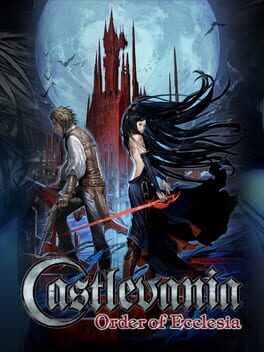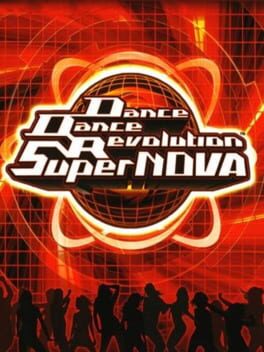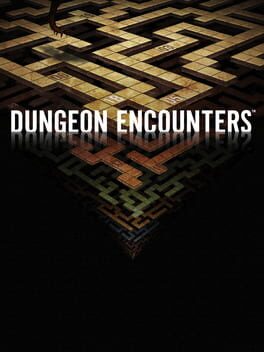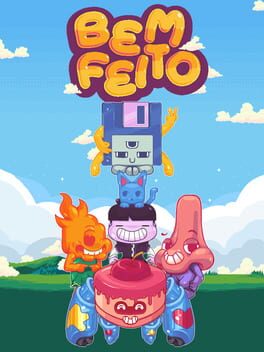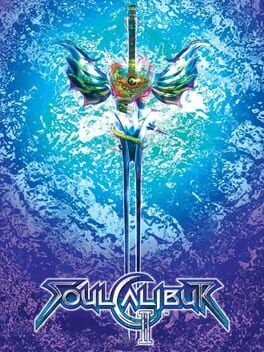NunchuckPup
2021
Games like The Stanley Parable or Inside do a lot with atmosphere and/or meta-narrative to appear one way, but drastically change into something else. But they’re a little hand-holdy and don’t have much mechanical depth; you’re meant to progress, not to necessarily experiment or investigate beyond what the game is (sometimes literally) telling you to do.
Inscryption starts as a lean, but surprisingly deep deckbuilder. You’re playing a sort of card game/tabletop RPG against a shadowy figure. Then he literally asks you to stand up from the table to fetch something, and the game becomes something else, as well.
Without spoiling anything, the game keeps becoming new things. Many times over, you will feel like you’re coming up to the end of Inscryption only to have another layer peeled back - not just in terms of the mysterious story, but engaging new gameplay mechanics and puzzles. There seems to be no limit to the clever ideas and ways to play that Inscryption throws at you.
I didn’t want it to end. And once again, no spoilers - but the game plays off of that feeling, as well.
In the same way that I think everyone needs to at least try Celeste, even if you hate difficult platforming (which I certainly do), Inscryption is a must-play even if you’re worn out on deckbuilding roguelikes. It insists on being much, MUCH more than that.
Ok, one spoiler:
.
.
.
.
.
.
.
.
.
.
If you finish the game and want more, search “Inscryption ARG”.
Inscryption starts as a lean, but surprisingly deep deckbuilder. You’re playing a sort of card game/tabletop RPG against a shadowy figure. Then he literally asks you to stand up from the table to fetch something, and the game becomes something else, as well.
Without spoiling anything, the game keeps becoming new things. Many times over, you will feel like you’re coming up to the end of Inscryption only to have another layer peeled back - not just in terms of the mysterious story, but engaging new gameplay mechanics and puzzles. There seems to be no limit to the clever ideas and ways to play that Inscryption throws at you.
I didn’t want it to end. And once again, no spoilers - but the game plays off of that feeling, as well.
In the same way that I think everyone needs to at least try Celeste, even if you hate difficult platforming (which I certainly do), Inscryption is a must-play even if you’re worn out on deckbuilding roguelikes. It insists on being much, MUCH more than that.
Ok, one spoiler:
.
.
.
.
.
.
.
.
.
.
If you finish the game and want more, search “Inscryption ARG”.
Symphony of the Night is still my favorite metvania, but Order of Ecclesia is almost objectively the best.
It's another entry solidly on one end of the Metroid-to-Castlevania spectrum: less focused on platforming and a fine-tuned linear weapon/ability upgrades, much more on throwing lots of ideas at the wall and letting the player find out what sticks. But this time, Igarashi & Co get pretty close to having the best of both worlds; namely, the Glyph weapons present some compelling strategic choices, and the overall difficulty is steep enough that you need to make the most of those choices.
There are other nice features. The quest system is more compelling than the previous game (Portrait of Ruin) and yields better rewards; for example, running errands for the Chef earns you better healing item options than the standard Potions you can buy at game start. The character art by Masaki Hirooka is a stunning shift from the generic anime art we saw in Portrait of Ruin or Dawn of Sorrow, much more like Ayami Kojima's gorgeous designs dating back to Symphony, but bringing their own unique energy. And of course the Michiru Yamane OST absolutely rules.
Perhaps most surprising is that Order of Ecclesia's story is interesting from beginning to end. Whereas previous Castlevania plots dragged out or got cliché, Shanoa and Albus' tale has some genuinely interesting twists and big emotional moments throughout the whole runtime. Bonus: it's more self-contained and less reliant on wider Castlevania lore than almost any other in the series. Great place to jump in if you're new to the series or genre.
To put it plainly, Order of Ecclesia is exceptional - well worth going out of your way to get a DS (or an emulator) just to play it.
My ranking of the GBA/DS Castlevanias:
1. Order of Ecclesia
2. Aria of Sorrow
3. Portrait of Ruin
4. Dawn of Sorrow
5. Circle of the Moon
6. Harmony of Dissonance
It's another entry solidly on one end of the Metroid-to-Castlevania spectrum: less focused on platforming and a fine-tuned linear weapon/ability upgrades, much more on throwing lots of ideas at the wall and letting the player find out what sticks. But this time, Igarashi & Co get pretty close to having the best of both worlds; namely, the Glyph weapons present some compelling strategic choices, and the overall difficulty is steep enough that you need to make the most of those choices.
There are other nice features. The quest system is more compelling than the previous game (Portrait of Ruin) and yields better rewards; for example, running errands for the Chef earns you better healing item options than the standard Potions you can buy at game start. The character art by Masaki Hirooka is a stunning shift from the generic anime art we saw in Portrait of Ruin or Dawn of Sorrow, much more like Ayami Kojima's gorgeous designs dating back to Symphony, but bringing their own unique energy. And of course the Michiru Yamane OST absolutely rules.
Perhaps most surprising is that Order of Ecclesia's story is interesting from beginning to end. Whereas previous Castlevania plots dragged out or got cliché, Shanoa and Albus' tale has some genuinely interesting twists and big emotional moments throughout the whole runtime. Bonus: it's more self-contained and less reliant on wider Castlevania lore than almost any other in the series. Great place to jump in if you're new to the series or genre.
To put it plainly, Order of Ecclesia is exceptional - well worth going out of your way to get a DS (or an emulator) just to play it.
My ranking of the GBA/DS Castlevanias:
1. Order of Ecclesia
2. Aria of Sorrow
3. Portrait of Ruin
4. Dawn of Sorrow
5. Circle of the Moon
6. Harmony of Dissonance
The worst PS2 DDR, simply because it is the most tedious method of unlocking songs. You either need to complete inane, confusing challenges in the obtuse Stellar Master Mode (lol what does that even mean) or play 12 hours. No, not leaving your console running for 12 hours; I mean actually playing 12 hours of music. Which is a real punisher when you consider that this starts with one of the smallest playlists of songs in the whole series.
But it's still DDR. This one gets bonus points for its range of genres - there's early 2000's indie rock, hard jazz, emo, Eurobeat, ska, J-pop, a song about a monkey stealing ice cream (?), and more. Just wish it weren't such a chore to unlock it all.
But it's still DDR. This one gets bonus points for its range of genres - there's early 2000's indie rock, hard jazz, emo, Eurobeat, ska, J-pop, a song about a monkey stealing ice cream (?), and more. Just wish it weren't such a chore to unlock it all.
2021
Layer 1: Dungeon Encounters looks like the devs said "good enough" and called it a day.
Layer 2: There's a surprising level of polish here. Nice little character bios, cool rock guitar battle music, and the battle system has more depth than it lets on.
Layer 3: Once again I find myself starting all the way back at the first floor with my weakest characters, tediously trying to save my main party who were all KOed and/or turned to stone by a surprise overleveled enemy party. They're stuck on floor 20, which took me forever to get to, but I know there's 99 floors total and I've barely scratched the surface of what this game expects me to do. What started as a lean distillation of my favorite aspects of JRPGs has turned into the grindy tedium that I originally feared it would be.
I spoiled the ending for myself by looking it up online. I won't ruin it for you; I will simply say that if I spent the hundreds of hours necessary to get there, and that's all that happened, I would be pretty upset.
Dungeon Encounters does a lot of things right, and it could have been fine-tuned to be a much more enjoyable and stimulating journey than it is. I like the idea of an Into The Breach-style approach to the JRPG format; simplified aesthetic + deep strategy. But clearly, the devs said "good enough" and called it a day.
Layer 2: There's a surprising level of polish here. Nice little character bios, cool rock guitar battle music, and the battle system has more depth than it lets on.
Layer 3: Once again I find myself starting all the way back at the first floor with my weakest characters, tediously trying to save my main party who were all KOed and/or turned to stone by a surprise overleveled enemy party. They're stuck on floor 20, which took me forever to get to, but I know there's 99 floors total and I've barely scratched the surface of what this game expects me to do. What started as a lean distillation of my favorite aspects of JRPGs has turned into the grindy tedium that I originally feared it would be.
I spoiled the ending for myself by looking it up online. I won't ruin it for you; I will simply say that if I spent the hundreds of hours necessary to get there, and that's all that happened, I would be pretty upset.
Dungeon Encounters does a lot of things right, and it could have been fine-tuned to be a much more enjoyable and stimulating journey than it is. I like the idea of an Into The Breach-style approach to the JRPG format; simplified aesthetic + deep strategy. But clearly, the devs said "good enough" and called it a day.
2023
2002
First off, this is one of the funniest fucking games I've ever played. Beating someone within a pixel of death then taking one wrong step and getting blasted out of the ring for it? Getting launched 20 feet into the sky by Taki? Voldo, in general? All comic gold.
As a kid I ate up the Weapon Master mode, which is the best single player campaign I've ever seen in a fighting game to this day. Recently we started running this at my fighting game locals, and it's got as much depth as the best games in the genre. So excited to keep digging into this game and to plumb the depths of its easy-to-learn-lifetime-to-master mechanics.
It's a shame that all the following SC games added universal mechanics that essentially invalidated the unique character traits and turned this into one big RPS. SoulCalibur II stands as the most pure, probably the most well-balanced, definitely the most fun in the whole series.
TLDR: An easy frontrunner for best 3D fighting game ever made.
As a kid I ate up the Weapon Master mode, which is the best single player campaign I've ever seen in a fighting game to this day. Recently we started running this at my fighting game locals, and it's got as much depth as the best games in the genre. So excited to keep digging into this game and to plumb the depths of its easy-to-learn-lifetime-to-master mechanics.
It's a shame that all the following SC games added universal mechanics that essentially invalidated the unique character traits and turned this into one big RPS. SoulCalibur II stands as the most pure, probably the most well-balanced, definitely the most fun in the whole series.
TLDR: An easy frontrunner for best 3D fighting game ever made.

